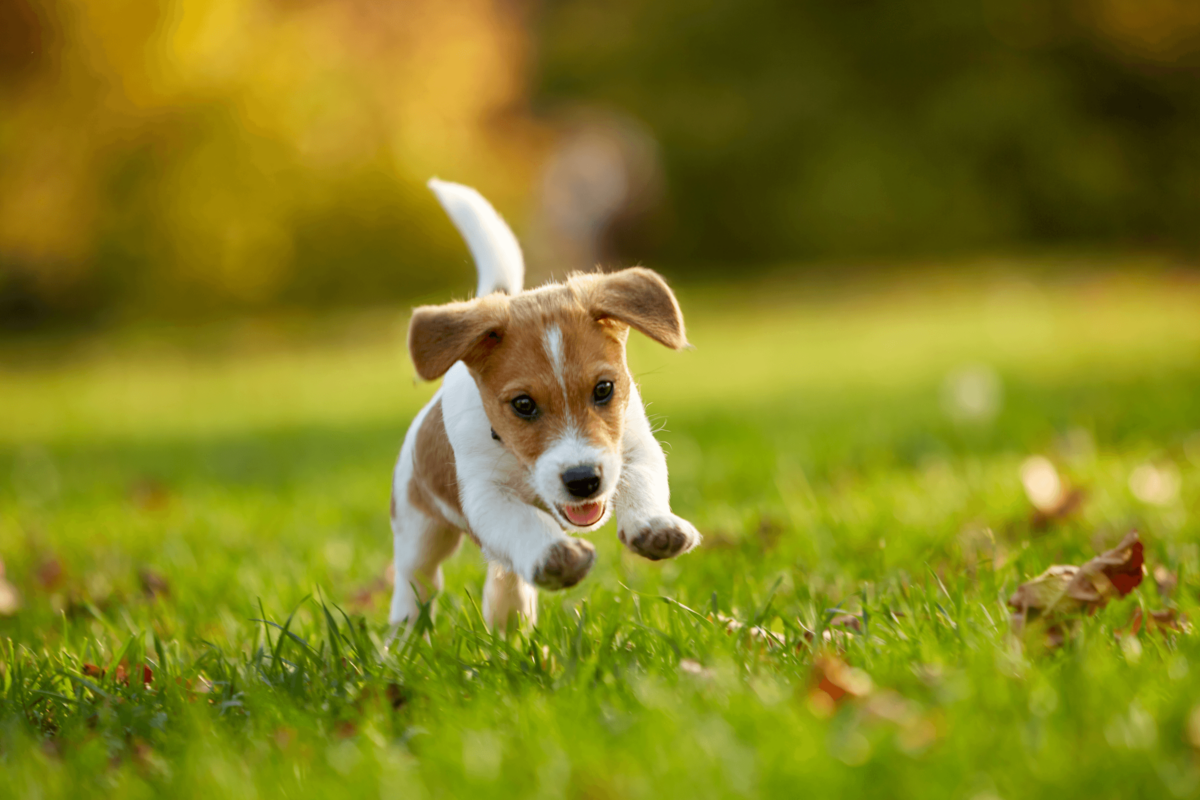Puppyhood is a crucial time for physical and emotional development. However, the critical socialization window, when puppies form important impressions about their surrounding world, coincides with their vaccination schedule. You may have received conflicting recommendations about keeping unvaccinated or partially vaccinated puppies away from other dogs while their immune systems develop, and providing safe socialization opportunities. To help you make the best decisions for your puppy, we are sharing important information about the risks and rewards of puppy socialization.
What is puppy socialization and why is it important?
Pet owners commonly think of puppy socialization as the time when puppies learn to play and get along with other dogs. In truth, socialization includes exposing puppies not only to other dogs, but to various people, experiences, places, and objects. The optimal time to socialize a puppy is between 3 and 14 weeks of age, but efforts should continue well into adulthood to maintain positive associations with new and familiar objects and situations.1 Keeping each experience brief and positive is crucial to success.
Puppies who aren’t socialized properly are more likely to develop behavioral problems, including fears and phobias. Incomplete socialization is a common reason for dogs to develop fear-based aggression toward strangers, children, or other pets, which can cause life-long problems. Ensuring dogs are comfortable with everyday situations can help them move through the world with confidence and ease.
What are the risks of puppy socialization?
One barrier to puppy socialization is the overlap between the socialization window and a puppy’s vaccination schedule. Most puppies don’t start their vaccination series until 6 weeks of age and it can be extremely dangerous to expose a young, unvaccinated puppy to other dogs or areas where other dogs have been.
Previous recommendations stated that puppies should complete their entire vaccination series before socializing in public places. However, following this recommendation means that puppies are stuck inside their homes for the entire socialization period, putting them at risk of
future behavioral problems. To mitigate this risk, experts now recommend puppies begin socializing after receiving only one set of core vaccinations and deworming medication.2
Making the right choices for your puppy’s development
Approximately seven days after your pup’s first vaccination, you can begin carefully socializing them with family or friends’ dogs who are fully vaccinated and taking them to meet new people in varied places. Avoid places where unknown dogs gather, such as dog parks, daycares, and pet stores, until your puppy has completed all vaccination rounds.3 Puppy classes are an excellent option, because vaccination is typically required of participants and your pup can safely meet other puppies and learn to interact appropriately. Puppy classes also typically include exposure to everyday things like bicycles, strollers, umbrellas, sounds, various surfaces, and veterinary care in an emotionally protective and fun manner.
Staying on schedule and completing all recommended vaccinations is another way you can protect your puppy’s future. During these crucial first few visits, your puppy forms opinions about the veterinary team and facility. Choosing a Fear Free Certified® Practice will help your puppy form positive associations with veterinary care from the start, and prevent fear, anxiety, and stress.
Many Fear Free Certified Practices use low-volume combination vaccines found in the TruCan product line by Elanco. TruCan Ultra vaccines can be administered faster than traditional 1.0 mL vaccines and cause less injection-related discomfort, ensuring each puppy visit is a positive experience.
With careful planning and dedication, you can ensure your puppy receives the socialization they need while also protecting them from infectious diseases. For more information about Fear Free vaccination protocols, socialization recommendations, or puppy classes near you, contact a Fear Free Certified Professional in your area.
Sources:
- Howell, Tiffani J et al. “Puppy parties and beyond: the role of early age socialization practices on adult dog behavior.” Veterinary medicine (Auckland, N.Z.) vol. 6 143-153. 29 Apr. 2015, doi:10.2147/VMRR.S62081.
- “Behavior Society Supports Early Puppy Socialization.” American Veterinary Medical Association, 1 Oct. 2008, www.avma.org/javma-news/2008-10-01/behavior- society-supports-early-puppy-socialization. Accessed 12 Mar. 2024.
- Grenus, Brittany DVM. “When Can a Puppy Go Outside Safely?” PetMD, 2 Feb. 2023, www.petmd.com/dog/general-health/when-can-puppy-go-outside. Accessed 12 Mar. 2024.
TruCan, Elanco, and the diagonal bar logo are trademarks of Elanco or its affiliates. Other company and product names are trademarks of their respective owners.
©2024 Elanco or its affiliates. PM-US-24-0257
This article was reviewed/edited by board-certified veterinary behaviorist Dr. Kenneth Martin and/or veterinary technician specialist in behavior Debbie Martin, LVT.
Want to learn more about Fear Free? Sign up for our newsletter to stay in the loop on upcoming events, specials, courses, and more by clicking here.








